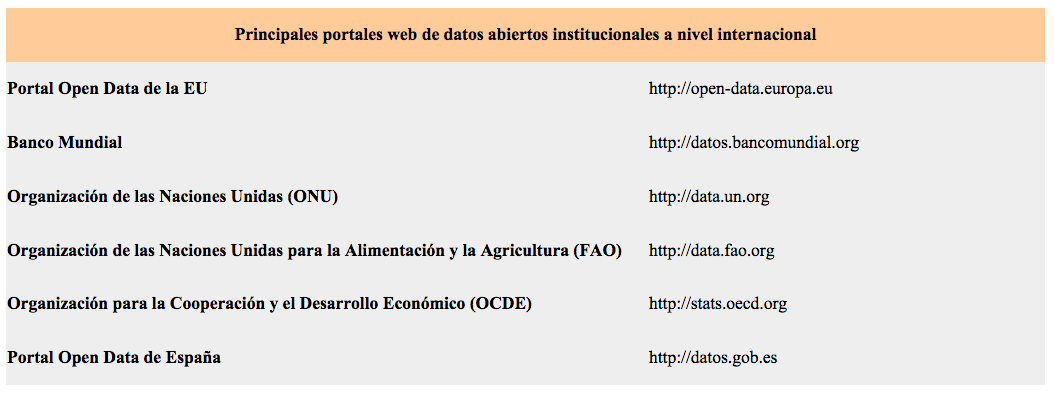Data are becoming an increasingly valuable asset for practically any activity in our society. They are now such a familiar part of our daily lives, for businesses and citizens, that it is commonly understood that they need to be shared. In this sense, open data portals are emerging as an important tool in the overall strategy of opening data.
International projects
For this reason, little by little, administrations and institutions are making available to everyone catalogs and web portals focused exclusively on open data. For example, specialized websites like those of the European Union,World Bank, UN, OECD and FAO, among others, are open to any citizen and business.
Not only that – several initiatives are being developed to promote the use and reuse of public information. A good example is the European consortium Apps for Europe, formed by around 20 organizations and companies from 10 countries related to the opening of data and innovation. Its goal is to connect the different stakeholders of the open datacommunity in the continent and create a pan-European market for applications based on open data. To do this, the network has organized an international competition that includes more than 20 local events; an initiative aiming to foster the development of innovative solutions that reuse public information and provide alternatives for feasible businesses.
City SDK is another European consortium that includes, in this case, 23 organizations from nine countries. Its mission is to provide municipalities the possibility of opening their data to the public. To do this they give developers the tools to create applications that are scalable from one city to another.
On a more local level, various administrations are contributing also to the opening of public data. New York, for example, is challenging its citizens to propose applications to make the city a better place to live or work through the project NYC Big Apps. Madrid has the competition Startup 4 Cities, and another one, MADdata, has just been launched aimed at entrepreneurs and developers offering innovative applications or services addressing the new challenges of urban development. To facilitate these initiatives, the City of Madrid has an open data portal containing more than four million data records. Created in March 2014, in its first months of operation the website has already registered 56,000 downloads of data files.
Initiatives like these make it easier for entrepreneurs and startups to have relevant data, for example, to create a mobile application as a starting point to innovate and reuse that information. The opening of public data can become an engine for innovation, as that information can be used to define new services or applications.
There are actually many examples of tools based on the re-use of data from the public administration. Moovit, for example, is an app for mobile devices based on open data that allows planning transportation routes in real-time crossing public information from municipal transport companies in Spain. It currently includes data from Madrid, Barcelona,Bilbao, San Sebastian, Vitoria-Gasteiz and Pamplona.
Other private initiatives
Private organizations are also increasingly working along these lines. Besides integrating the open data philosophy into their overall strategy, they are promoting more and more initiatives to encourage entrepreneurs and developers to create tools based on open data through Hackathons, Datathons, Challenges or Code for competitions.
This is the case of the BBVA InnovaChallenge, a clear commitment of the organization with Big Data and open innovation. During this competition the bank opened for the first time its commercial activity data to an API, which participants could access to create their apps.
The winners of the competition were innovative applications such as Qkly, a trip planner that reduces the waiting time in queues of shops or payment services; Chances, an app targeted to future entrepreneurs which allows to know beforehand if a business can be potentially successful or if it needs to be improved; and BBVAPlaces, an analysis tool that provides answers to questions such as the relationship between the density of retail business in a given area and the number of transactions, in addition to the evaluations published by users via social networks such as Google places.
The value of an open data strategy
As we can see, there are many initiatives that are tapping the potential of collective intelligence, the niche of potential entrepreneurs and the spirit of innovation to move towards a more intelligent management.
Furthermore, in an increasingly interconnected world, integrating an open data strategy into the overall strategy of an organization is key to identify the main demands of customers or citizens.
The promotion of open initiatives can provide other benefits such as: new feedback channels to improve the quality and reliability of data; the ability to use tools and techniques that help establish new mechanisms to capture and improve data; or enable private-public collaborations for the exploitation of new data, developing a global culture of open data.



























